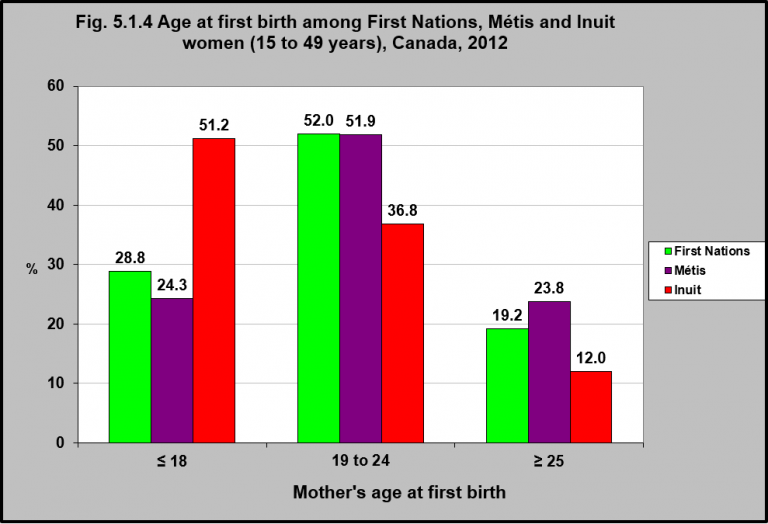Age at first birth among First Nations, Métis and Inuit women, 15 to 49 years, Canada, 2012

Notes:
Excludes persons living on Indian reserves or settlements.
Indigenous identity includes persons living off reserve who reported being an Indigenous person, that is, First Nations (North American Indian), Métis or Inuk (Inuit) and/or those who reported Registered or Treaty Indian status, that is registered under the Indian Act of Canada, and/or those who reported membership in a First Nation or Indian band. The sum of the categories included in this variable is greater than the total population estimate for Indigenous identity because a person may have reported more than one Indigenous identity: for example, a person could self-identify as both First Nations and Métis. Respondents were asked: “At what age did you have your first child?”.
Source: CICH graphic created using data adapted from the Aboriginal Peoples Survey 2012, Public Use Microdata File (PUMF). http://www5.statcan.gc.ca/olc-cel/olc.action?ObjId=89-653-X2015005&ObjType=46&lang=en&limit=0 -accessed August 22, 2017.
In 2012, the majority (52%) of First Nations and Métis women had their first babies between the ages of 19 and 24.
The majority of Inuit women had their first babies when they were younger than 18.
A smaller percentage of women in all three groups had their first baby over the age of 24.
Implications
Indigenous girls aged 15-19 years are more likely to become parents than non-Indigenous teenage girls. The 2006 Census indicates that while only 1.3% of non-Indigenous teenage girls were parents, 8% of Indigenous teenage girls were parents (9% of all First Nations and Inuit girls, 12% of First Nations girls living on reserve, but only 4% of Métis teenage girls).1 While being a teen parent can have consequences in terms of increasing vulnerability to socio-economic disadvantage (with concomitant poorer health outcomes), Indigenous cultures do not necessarily view teenage pregnancy from the same perspective as non-Indigenous peoples. This highlights the need for a wide range of culturally appropriate supports for young pregnant and parenting Indigenous women and culturally appropriate information about sexuality and contraceptive use for Indigenous teens in general.2
1O’Donnell, V., & Wallace, S. (2011). First Nations, Métis and Inuit women. Ottawa, ON: Statistics Canada – Catalogue no. 89-503-X.
2Archibald, L. (2004). Teenage pregnancy in Inuit communities: Issues and perspectives. Ottawa, ON: Pauktuutit Inuit Women’s Association.
